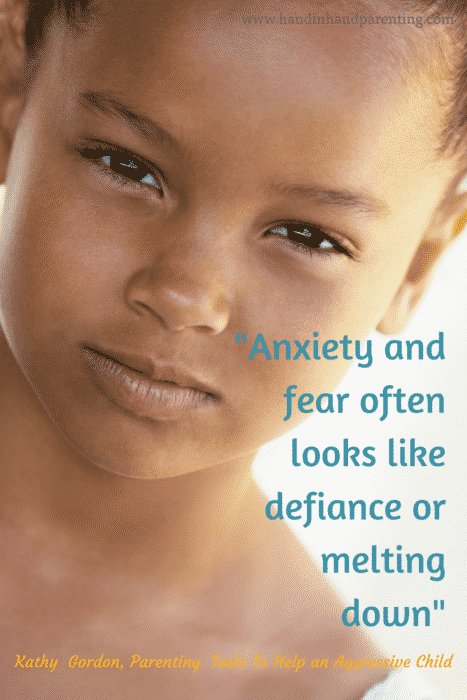![]()
Dear Hand in Hand,
My child is having serious aggression issues at school. She's been acting out a lot. Her teachers tell me she throws tantrums and she cries loudly when she gets told off. I'm not sure how to respond – to the teachers or my daughter! I want a good school experience for her, for her to learn and have good friends, but at the moment life feels miserable for all of us.
Confused and Upset Mom
 School is so hard on our sweet kiddos. They are separated from us for a long time and there is just not enough connection, safety and support in your average classroom with one adult and some 20-40 children.
School is so hard on our sweet kiddos. They are separated from us for a long time and there is just not enough connection, safety and support in your average classroom with one adult and some 20-40 children.
Your daughter is doing the very best she can to signal for HELP!
At Hand in Hand we stand firm in our belief that children are good and that they are naturally cooperative, generous and loving. However, humans of any age need to feel safe and connected in order to be cooperative. When we feel unsafe and disconnected, we go off-track. We can’t think. We certainly can’t learn. In your daughter’s case, it sounds like a big chunk of anxiety and fear is being kicked up.
Anxiety and fear often looks like defiance or melting down, but what actually happens is that our fight/flight instinct hijacks our thinking brain. Adults around her might think that she’s choosing to behave this way, but because Hand in Hand understands how emotions work, we see a tantruming child as a disconnected, scared child, who is signaling for help.
I don’t know enough about your family to know what might be causing your sweet girl to go off-track. What we do know is that parents are really the best expert when it comes to their children.
Here are some things you can do to figure out what’s going on, so that you can help your daughter come back to her naturally cooperative, generous and loving self.
Have Someone Listen To You
Get Listening Time for you. Nothing is harder for a parent than when their child is “misbehaving” in public. We feel judged. We hate that our child is being judged, and these feelings make it almost impossible for us to think well about our child or the situation. We recommend our parent-to-parent support tool called Listening Partnerships. This works as an exchange of listening time, designed to allow parents to say all the things that run around in our mind.
You get to vent about your child, the teachers and the school, in a safe place where you won’t be judged, interrupted or even given advice. Your Listening Partner is going to hold the thought that you are good, your child is good and everyone involved is doing the best they can in the moment. Your partner will think those thoughts so that you can really dump all your feelings and get them all out. You can talk about what’s great about your child, and what you just can’t stand right now.
As you get Listening Time for yourself, you will be able to think well about:
- Is this the best learning environment for my child?
- How can I find out if there are things at school that may be making her feel unsafe?
- How can I approach the administration on this subject? What do I want to say/ask of them?
- Are there physical or processing factors that might be causing her to feel overwhelmed? Health issues? Learning challenges?
- Are there things going on at home that are causing her to feel disconnected? Big changes lately? My own stress? My partner traveling or leaving?
- Were there hard things in her early life? A difficult birth or early medical intervention?
We have a booklet, Listening Partnerships for Parents, that outlines how to set this up for yourself.
As our children go out into the world, we will have less and less control over the flow of their day and how others interact with them. Therefore, we need to get emotional support so that we can think clearly about all that might be going on and all that might be affecting our child.
They often can only show us they are hurting by getting upset and stomping their feet.
In a perfect world, it would be great if schools and teachers were trained and supported themselves, so that they could partner with us in this inquiry of why your daughter is having such a tough time. As you advocate for your daughter, you might be able to share some of the Hand in Hand ideas with them, and you could find allies.
In the meantime, there are definitely things you can do at home to boost your daughter’s sense of safety, connection, confidence and resiliency.
The first very good thing that could happen is that, as you increase the safety and connection at home, she may be able to share with you what’s happening at school.
At Hand in Hand we call these big or ongoing difficulties Emotional Projects.
Something is blocking your daughter’s natural goodness. these steps will help you discover what it might be and help her through it.
YOU get lots of listening time with a Listening Partner
Start your day with Special Time – give your daughter one-on-one undivided attention during which you follow her lead. This will help to send her off to school feeling connected and more grounded. Because you take the less powerful role and follow their lead, Special Time will help counter how powerless she must be feeling at school.
In general, when working on an Emotional Project, we recommend that you do Special Time two to three times each day in short doses. Here is a Special Time check list. And a couple other articles on the value of Special Time:
Get a Special Time Checklist
Start school days by boosting connection: Read Start School Days with Special Time
We also recommend that whenever you can, you leave a little buffer of time after the timer buzzes at the end of Special Time. The safety and connection that Special Time brings will invite her to show you how hard life is for her right now.
Some feelings may bubble up and you want to have time to Staylisten to those feelings. You can read more about this in Why Do My Kids Cry After We Have Good Fun?
Why Limits Help Security
 Look for some opportunities to set little limits and then listen. These opportunities can be things that you might normally do for her – tie her shoes so you get out the door faster, give her a different piece of toast.
Look for some opportunities to set little limits and then listen. These opportunities can be things that you might normally do for her – tie her shoes so you get out the door faster, give her a different piece of toast.
We often do lots of work-arounds with an unhappy child just to avoid an upset, but when working on an emotional project, you want to strategically invite the upset and give her a chance, a pretext, to dump the feelings, fears and tension that are causing her to go so off-track at school.
You will be giving her a real gift if you carve out time to really listen to her at home. Read how this works in Saying No to Help Release
Skin to Skin Contact Can Raise Safety and Security
Do lots of rough and tumble play during which you take the less powerful role. This provides skin-to-skin contact – our kids can really feel the connection and, again, this kind of roughhousing can help counter their feelings of powerlessness.
And look for ways to set limits playfully – laughter is soooo connecting and we release light fears when we laugh. However, please do not tickle. When we tickle – even when our kiddos ask for it – we’ve put ourselves in the more powerful role. To help a child work through a tough time, we always want to take the less powerful role when we playlisten. See why this type of play is so powerful in Playlistening: Play that Lets Children Lead
Meaningful Connections: Getting Teachers and the School on Board
On our website, we have a many more articles on helping children with school. Some of those were written by Hand in Hand Instructors, who also work in schools as teachers and social workers, including this wonderful article from Instructor Sarah Charlton, What Playful Limits Look Like at School and a podcast from two instructor teachers, helping your child head back to school.
Keeping Home A Safe Place
After you’ve gotten some Listening Time and figured out how you want to approach the school, you might share this article and podcast with them.
Only you know your child and know what is best for her.
Know that the emotional work you do with her at home may help her to be resilient and cooperative at school, unless this particular school is not a safe place for her.
The most important message you can give your daughter as you listen to her feelings at home, is that there is nothing wrong with her. It is really OK for her to have big feelings, and you are providing a safe place at home for her to have those feelings. Given that message, she may not have to stomp and fume at school. She will know that you are ready and waiting for her to dump her emotional backpack at home.
We do believe that YOU getting Listening Time is the best way for you to sort through your feelings and think well about her and her education. If setting up a listening time feels like an extra burden when you need immediate attention, you can try our own Instructor Consultations. You'll get direct listening time to work on your feelings around the subject one-on-one with an instructor, as well as some practical tips and advice.
Using these Listening Tools daily, we trust that you two will figure this out.
You are such a smart Mama to reach out for ways to help your sweet girl.
